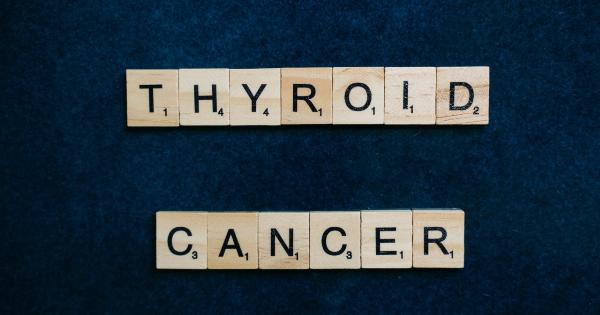Thyroid cancer is a type of cancer that develops in the cells of the thyroid gland, which is located at the base of the neck. The thyroid gland plays a crucial role in producing hormones that regulate various bodily functions.
When cancerous cells form in the thyroid gland, it disrupts the normal functioning of the thyroid and can have significant implications on overall health.
Diagnosis and Treatment
Diagnosing thyroid cancer typically involves a series of medical tests and examinations. A physical examination of the neck may be performed to check for any abnormal lumps or growths.
Additionally, blood tests can measure the levels of certain hormones and proteins that may indicate the presence of cancer.
If thyroid cancer is suspected, imaging tests such as ultrasound, CT scan, or MRI may be conducted to obtain detailed images of the thyroid gland.
A biopsy, where a small tissue sample is taken from the thyroid gland, is often necessary to confirm the diagnosis of cancer.
Treatment for thyroid cancer may vary depending on the type and stage of cancer, as well as the individual’s overall health.
The primary treatment options include surgery, radioactive iodine therapy, external beam radiation therapy, and targeted drug therapy. In some cases, a combination of these treatment modalities may be used to achieve the best possible outcomes.
Managing Thyroid Cancer Symptoms
Living with thyroid cancer can be challenging, as the disease and its treatments can often cause a range of physical and emotional symptoms.
However, there are several strategies that can help individuals manage these symptoms and enhance their overall well-being.
Eating a Balanced Diet
A healthy, balanced diet is crucial for individuals with thyroid cancer. It is important to consume foods that provide essential nutrients to support the body’s overall health and aid in the recovery process.
Including a variety of fruits, vegetables, whole grains, lean proteins, and healthy fats can help maintain optimal nutrition levels.
It is advisable to consult a registered dietitian who can create a personalized meal plan that takes into account any dietary restrictions or specific needs related to thyroid cancer treatment.
Staying Physically Active
Regular exercise offers numerous benefits for individuals with thyroid cancer. Physical activity can help improve energy levels, reduce fatigue, enhance mood, and promote overall well-being.
Engaging in activities such as walking, swimming, yoga, or low-impact exercises can be both beneficial and enjoyable.
Prior to starting an exercise routine, it is essential to consult with healthcare professionals to ensure it is safe and appropriate, as some treatments or surgeries may require modifications or temporarily limit certain activities.
Managing Fatigue
Thyroid cancer and its treatments can often result in fatigue, which can significantly impact daily life. To manage fatigue effectively:.
– Prioritize rest and sleep, ensuring adequate sleep duration and quality.
– Plan activities and tasks throughout the day, balancing them with frequent breaks to conserve energy.
– Engage in light exercises or activities to combat fatigue.
– Consider mindfulness and relaxation techniques, such as deep breathing exercises or meditation, to reduce stress and improve energy levels.
Remember that everyone’s experience with fatigue may differ, so it is essential to listen to the body and adapt strategies accordingly.
Coping with Emotional Challenges
A diagnosis of thyroid cancer can evoke a range of emotions, including fear, anxiety, sadness, or frustration. It is crucial to acknowledge and address these emotions, as mental well-being is an integral part of managing the disease.
Seeking support from loved ones, joining support groups, or working with a mental health professional can provide a safe space to express emotions and obtain guidance on coping strategies.
Engaging in activities that bring joy, practicing relaxation techniques, and maintaining a healthy work-life balance can also contribute to overall emotional well-being.
Communicating with Healthcare Providers
Open and effective communication with healthcare providers is key to managing thyroid cancer and ensuring the best possible care. Here are some tips for better communication:.
– Prepare a list of questions or concerns prior to appointments to ensure all relevant topics are discussed.
– Take notes during consultations to refer back to later.
– Seek clarification if something is unclear or if further information is needed.
– Discuss treatment options thoroughly, including potential risks, benefits, and side effects.
– Be proactive in sharing any changes in symptoms or any new concerns that arise.
Support from Loved Ones and Support Groups
Having a strong support network can make a significant difference in managing the challenges of thyroid cancer. Reach out to loved ones, friends, or support groups specifically tailored to individuals with thyroid cancer.
Participating in support groups can provide a sense of belonging, enable the sharing of experiences, and offer practical advice. Loved ones can offer emotional support, assist with daily tasks, accompany appointments, or simply lend an empathetic ear.
Making Lifestyle Modifications
In addition to medical treatments, there are certain lifestyle modifications that individuals with thyroid cancer can adopt to improve their overall well-being.
– Avoid tobacco and limit alcohol consumption: Smoking and excessive alcohol use can have detrimental effects on health and interfere with the effectiveness of treatments.
– Protect the thyroid scar: Following surgery, it is important to protect the thyroid scar from excessive sun exposure and apply sunscreen when necessary.
– Take prescribed medications as directed: Adhering to medication schedules is crucial for optimal treatment outcomes.
– Prioritize self-care: Engage in activities that promote relaxation, stress reduction, and personal fulfillment, such as hobbies, time with loved ones, or self-reflection.
Regular Follow-up and Monitoring
After initial treatment, regular follow-up appointments are necessary to monitor the progress of thyroid cancer. These appointments may include physical examinations, blood tests, imaging tests, or other relevant assessments.
Attending these appointments and following recommended surveillance protocols is essential for keeping track of any potential recurrence or changes in the disease status.
Early detection of any new developments can significantly improve treatment outcomes.



























